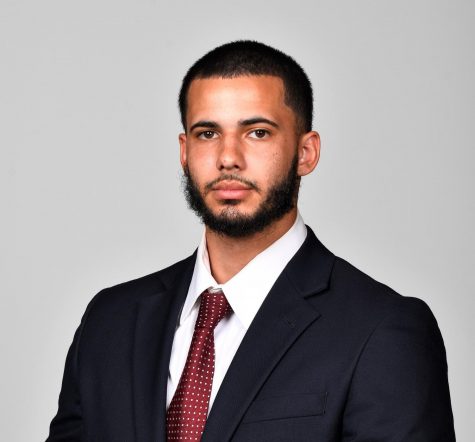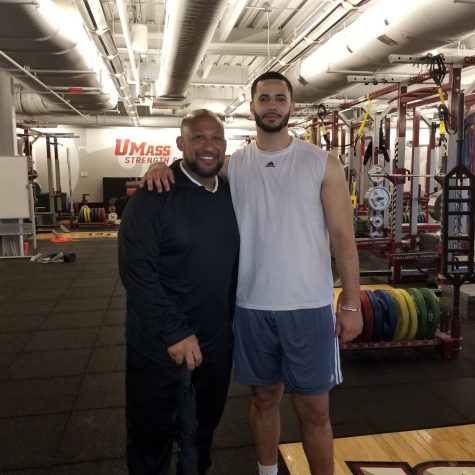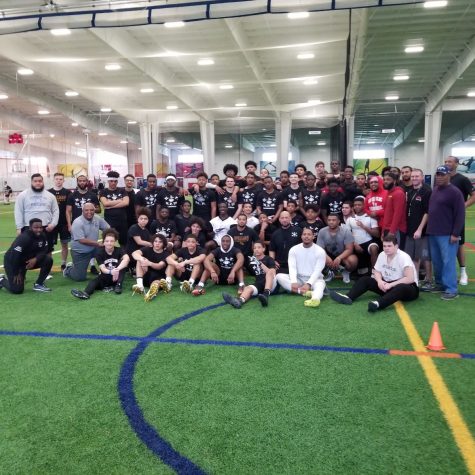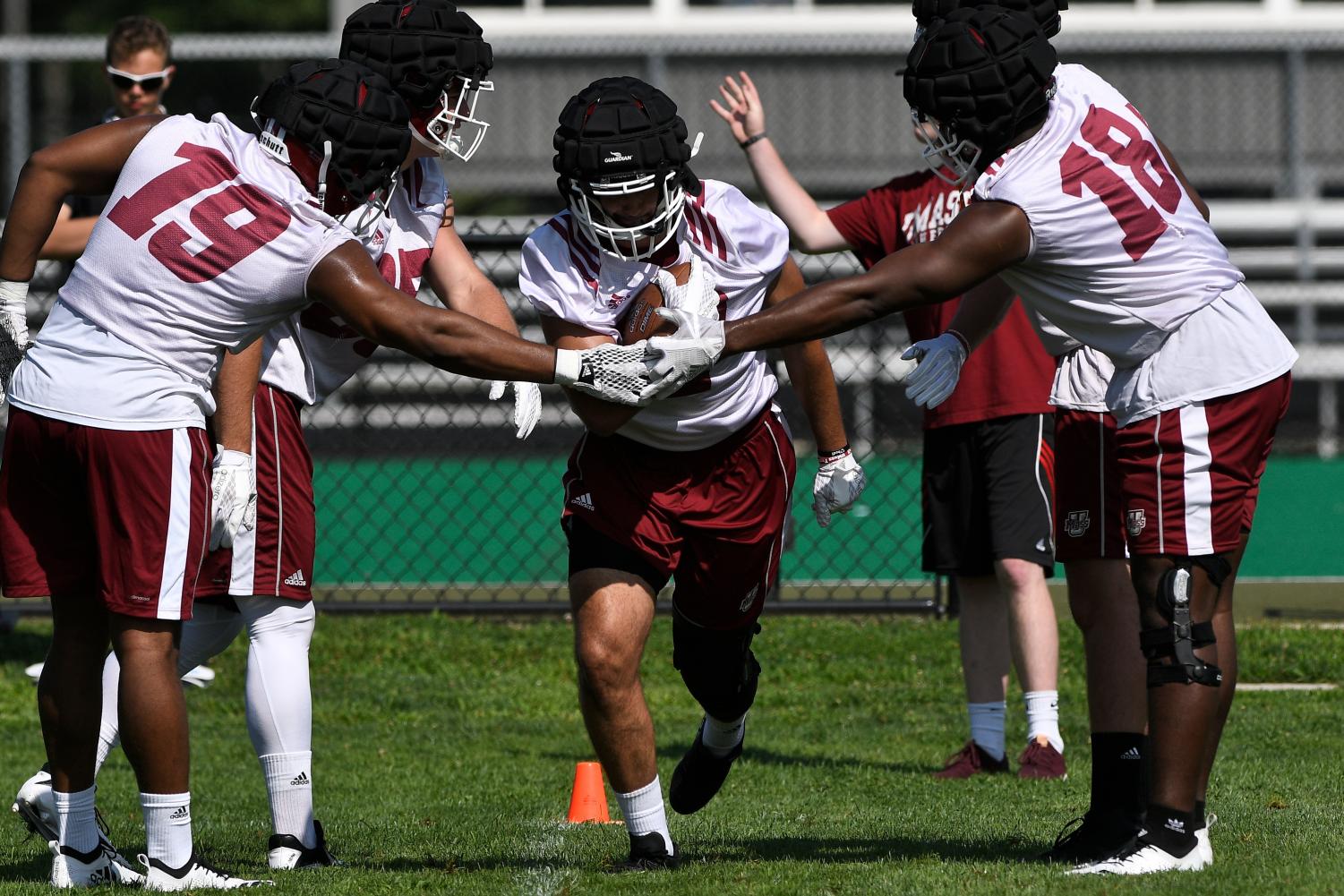Through his community, his family and his opportunities, Solomon Siskind is becoming the type of socially active leader the world needs
Solomon Siskind is leading the social activism charge for the Minutemen
October 15, 2020
Eight minutes and 46 seconds.
If you’ve paid any attention to the news this year, you would know that’s how long Minnesota police office Derek Chauvin knelt on the neck of George Floyd, fatally killing the 46-year old fiancé and father of five on May 25, 2020.
Floyd’s death is only one example of the countless, unnecessary and wrongful deaths suffered by people of color this year, let alone throughout history.
Breonna Taylor. Ahmaud Arbery. Tony McDade. The list, unfortunately, goes on. These are just some of the names that must be remembered in our country’s on-going fight against racism and systemic injustice.
The deaths of Floyd, Taylor, Arbery, McDade and countless others sparked numerous protests and social movements across the United States, with support for the Black Lives Matter movement continuing to grow, reaching majority support nationwide.
Floyd’s death occurred nearly two months after the University of Massachusetts decision to send all students home indefinitely due to the coronavirus pandemic. In an already uncertain and stressful time for just about everyone this spring, the pressure of racial injustice and wrongdoing grew heavy in the mind of those most vulnerable to the same injustices Floyd, Taylor, Arbery and McDade faced.
For Solomon Siskind and the Massachusetts football team, it was no exception.
“Personally, it was really heavy on my shoulders,” Siskind said on George Floyd’s death. “Speaking with and texting some of my teammates, we all kind of thought the same thing. It was tough because [the team] wasn’t together.”
With the feeling of uneasiness and fear settling in the minds of himself and his teammates, Siskind sprang to action. After Floyd’s death, the redshirt senior organized plans with head coach Walt Bell to get the team connected. Within a day and a half, Siskind was hosting Zoom forums with his teammates, addressing the ongoing events, sharing their voices, opinions and thoughts on how it affected each of them.
“It was just a great way for me to connect with my teammates and to hear what everyone’s going through,” Siskind said. “I knew we were all going through similar experiences, especially my Black teammates. It was a really good moment and I think it really brought us together.”
Any football team consists of a vast variety of people of different backgrounds. Whether Black or white, local to New England or not, or raised in the city or the suburbs, just about every football team from college to the pros consists of people each with a unique upbringing.
Though a football locker room might resemble something of a melting pot of culture and color, race can often be one of the most challenging or uncomfortable topics to address for any group of people. Not knowing what to say or the fear of saying something wrong can keep people from sharing what they have to say even in a time when these conversations are desperately necessary to hold.
Knowing the likelihood that they would run into this issue, Siskind and Bell addressed the elephant in the room prior to each Zoom discussion. Divided into breakout rooms by accountability groups—the team’s way of holding each member responsible for one another on and off the field—Bell would break awkward silences with a quick quip, allowing important discussion to flow freely.
“We knew we’d run into a moment where I would be facing the screen, where the majority of the group is white or doesn’t identify as a person of color,” Siskind said. “It came up in the third group and I’m okay with silence, I’ve learned from putting on these kinds of talks and other events that silence is okay sometimes to let people gather their thoughts. There were definitely some difficult moments but once we addressed it, people spoke their minds freely and it was very heartfelt conversations we had.”
While Zoom forums helped players process their emotions, words are not enough to make the kind of impact necessary to create systemic change. During these forums, Solomon frequently answered his teammates questions on what they could do to help within their own communities and down the road.
“Solomon has done a lot for us,” senior offensive tackle Larnel Coleman said. “He’s a big voice on the team and he’s helped give us a space where we can come together and talk about what’s been happening in the world. We’ve come together to pitch ideas so that we can help start the change in our community in Amherst.”
#BLM ❗️ pic.twitter.com/mXOzJIrcW3
— Zamar Wise (@ZamarWise11) August 28, 2020
If you follow Siskind on Twitter or scroll through his feed, you may recognize a pattern in what he shares online. Many of his posts address racial injustice, others focus on his hometown of Brockton, Massachusetts. A lot of posts reference hip-hop and rap music. One rapper referenced frequently on his page is the late Nipsey Hussle, who had a large philanthropic influence within his own neighborhood of Los Angeles.
There is one Nipsey acronym you wouldn’t be hard pressed to find on Solomon’s page: TMC, short for “the marathon continues.” Whether it be on the gridiron, in his personal life or in his activism, this is a motto Siskind abides by.
“The biggest thing I got out of Nipsey, The Marathon Continues, is sort of understand it’s my own journey,” Solomon said. “I’m really racing myself and I’m not going against anybody else and just enjoying the process. Whether that’s in football with having three knee surgeries and being able to still continue to play this game that I love. It’s really a blessing.
“Outside of that, being an activist and understanding that change isn’t going to come over night. Chipping away at it daily, that’s really how I think about the marathon continuing. If I can sort of do that and keep up his messaging, that’s great.”
Siskind had a major part in the Athletic Department’s initiative to get all student-athletes registered to vote, with the team running voter education classes as a staff. The Minutemen have also implemented “Financial Fridays” where guest speakers teach student-athletes about growing and accruing wealth, an important part of bettering their futures.
“Momentum just kept going and it’s led to other moments with the team coming together, asking how we can be better, what can we do to impact our communities back home,” Siskind said. “That tied up with the upcoming election, so that forum is how that transpired.”
“Solomon Siskind has led the charge there,” coach Bell said of the social justice movements on the team. “We organized meetings on Zoom with our team and some open forums. Solomon did an incredible job moderating the forums and getting our guys to have conversations. From there, it was determining what steps we can take to benefit our kids and help our student-athletes…Solomon has driven that every step of the way and our kids have done a great job.”
First, Happy Birthday to my beautiful wife, life partner, and team mom, @MxMendez! Second, if you’re a leader of business, leader of a community, or someone looking to improve their organization, @shlosiskind better be on your short list upon graduation. A true Massachusetts man!
— Walt Bell (@coachwaltbell) June 5, 2020
But, for Siskind, he was not always the outspoken, socially active man that he is today. His activism is a product of his dedication to justice, but also a result of where he grew up and how he was raised.
**
Raised in Brockton, Mass., Siskind’s home community has been historically struck by racial disparity and the aftereffects of redlining housing policy. Deemed “The City of Champions,” the former manufacturing hub and majority-minority community ranks 341 of 351 towns and cities in Massachusetts in terms of poverty rate. Though the public schooling system in Brockton has continuously improved in recent years, still only 42.5 percent of students attend 4-year universities out of the city’s public school system.
Siskind’s uncle, coach Michael Williams, addresses that problem.
“My uncle was my coach growing up and one of the strongest people in my life,” Siskind said. “He was my primary coach, the one that trained me.”

Williams is the leader of the Next Level Football (NLF) program ran by the Boys and Girls Clubs of Brockton. Next Level Football combines football training with classroom mentoring, allowing young men to use their athletic abilities as a way toward enrolling in a four-year university.
“We have the specific goal of identifying young men who have aspirations of going to college and making sure they knew how to use football as a vehicle to maximize all of that potential,” Williams said of his program. “Not all of our kids are going to go on to be Division I football players, but by using football the same way you would use the chess club or the drama club or anything of the like, it builds your resume and teaches you certain lessons about preparation.”
NLF extends beyond the average football training program by supplementing physical practice with academic programming. Training begins on Saturdays in early February through May with athletes attending classes before a two-hour football workout, providing each athlete with necessary equipment. Being mentored together allows these student athletes to form brother-like bonds and develop successful, future-oriented mindsets.
Next Level Football then brings students on college tours across the Northeast throughout the summer. The NLF program has seen over 90 percent of its participants attend four-year colleges out of high school as a result. Siskind was one of the first participants of the NLF program, which has helped propel him onto the Minutemen roster. Other successful former NLF students play football at schools including Bryant University and Brown University.
“I started mentoring because I wanted to do this, not just make good football players but make young men that contribute to society,” Coach Mike said. “Now it’s coming to fruition and I get to see it on a more regular basis than when I started, so for me it’s really gratifying.”
Though Next Level Football was officially formed with the Boys and Girls Club in 2015, coach Mike has been mentoring for far longer.
A lawyer and judge, Williams began coaching youth football in Brockton in 1993, during his second year of law school at Boston College. The Brockton native and former Eagles running back started coaching as a mental break from the realities and rigors of law school and became increasingly involved over the years.
By the year 2000, the group of youth players Williams had first coached matriculated to high school, where they asked Williams for further training after their season ended in early December. The leadership that coach Mike was offering was a rare resource in the Brockton community.
“When it comes to it, there’s nobody else that does what I do,” Williams said. “When it comes down to being a mentor for the city’s young men, especially young men of color, there’s nobody else that they can look to.”

Shortly after, Williams noticed the lack of information and resources his trainees were receiving from their coaches and the school. A major issue in a school system like Brockton’s is that the tiered structure of classes and curriculum can potentially make student athletes ineligible for NCAA participation without their knowledge.
“There was nobody proofreading their essay for college, nobody telling them about SAT prep courses, nobody telling them about football camps, no body telling them about the ACTs or academic qualifications,” Williams said.
“You had kids that got an A or B in a course that they think is an A or B, but because it’s at a lower level and not accepted by the College Board, their classes would not qualify for the NCAA. They are thinking they’re good, but when they get to be a senior, they’re not academically eligible for participation in Division I sports because those two classes you took as a freshman or sophomore don’t count. That was happening on a regular basis which is tragic.”
This issue occurs not only in Brockton but in other cities across Massachusetts including Boston Public Schools, added Williams. You would be pressed to find a Boston Public athlete who went directly to Division I college athletics without attending a prep school in between.
“You can’t tell me in all these large cities that we have, that they don’t have Division I caliber athletes,” Williams said. “What they do not have, is Division I caliber mentoring and that’s what’s missing systematically in any large city of the Commonwealth of Massachusetts. There might be a Mike Williams in one of these cities, but we can only do so much, that’s why it’s good for me to get Solomon Siskind’s around.”
Nothing stopped Williams from leaving Brockton and moving elsewhere when he completed law school at B.C. Rather, the dedication to give back to his community, the only place he has ever called home, brought him back.
While coach Mike serves as a mentor to many young athletes in Brockton, his own mentors are what encouraged him to endeavor down the career path he has today. He recalls having teachers that challenged him toward highly achieving in school, and a judge on the Massachusetts Supreme Court who showed him the ropes of what it is like to control a courtroom. From there, he was hooked on the idea of becoming a lawyer.
“The reason I do it is because somebody did it for me,” Williams said. “I had all these people who stood up and helped me out for no reason. I didn’t pay them; they didn’t have a reason to have an interest in me. I just feel that it’s my obligation to make sure that if there is another coach Mike or another Mike Williams out there waiting for some leadership or guidance, at least they can say there’s one person there who helped them out and gave them that insight, that roadmap and that light.”
“I think it’s because what we get exposed to, determines what we might think or believe that our options are.”

**
While coach Mike set the bar for Siskind on how to uplift his teammates and community, the senior tight end found his voice through other means.
Along with women’s basketball guard Desiree Oliver, Siskind was selected to attend the Black Student Athlete Summit in Austin, Texas last February. Student-athletes from colleges across the country presented on various topics related to sports, race and mental health throughout the day with opportunities to discuss what they learned in breakout groups. It was Siskind’s first time being exposed to so many Black leaders in this field, and a major moment of resolve for him.
Going into college, Siskind knew he wanted to work in the sports industry but was uncertain of the specifics. The February summit is what helped him find the niche of working in diversity and inclusion work. Since then, he has joined the Student Athlete Advisory Committee and sits on the athletic department’s diversity and inclusion subcommittee, giving his voice and input to what strides need to be taken.
When he returned from Texas, Siskind and Oliver presented to the executive staff of the UMass athletic department some of what they learned. With their newfound knowledge, the duo created a research project entitled “The Analysis of the Black Student Athlete Experience Inside a Predominantly White Institution” with a data-supported hypothesis stating that Black student athletes at UMass are at a disadvantage compared to their counterparts . Siskind and Oliver’s research project will be presented as the keynote address at the Fall Research Fair on November 5.
“Ultimately we found information that supported it where basically our student athletes aren’t accessing the same resources or feeling the same way that their counterparts are here at UMass,” Siskind said. “We wanted to identify ways to provide those to our student athletes.”
But Solomon knows that the activism he is trying to spread does not happen unless he and the rest of the UMass football team set an example for what needs to be done. The football program has put together a call to action addressing what they will do to embrace diversity and the community, including reshaping the narrative with local police organizations and creating a social injustice-focused video series to further the conversation.
“Just to see that change is coming, it’s not going to happen overnight,” Siskind said. “The one thing that I’ve spoken to coach Bell about is we have to make sure our bed here is made before we can go out and look at other schools and talk about other communities. I’m just excited to continue doing the work.”
Actionable points to create change. Steps that when done with purpose can make a difference within our individual campuses and within our communities. #sport490a https://t.co/R6QxgTGiZW
— Solomon Siskind (@shlosiskind) September 7, 2020
For the work to be completed, actions speak louder than words. Before returning to campus for summer workouts, Siskind was one of the thousands of protesters to participate in Black Lives Matter protest in Boston. Solution driven activism like Siskind’s is what will be the difference maker in making a brighter, more equal and just society.
“He’s thinking about social change not in the generic ‘oh things have to get better’ way but actually trying to put words into action by developing a program, by developing a curriculum, by developing thought processes,” coach Mike said of his nephew. “Being a solution driven individual is going to serve him well moving forward into the future.”
“If Solomon is able to carry on the messages I’ve given to him and the messages he passes on to others, and they can bring it back to their community, we can get more Solomon Siskind’s out there. For me, that one little pebble will make a huge ripple.”
Siskind plans on furthering his education in sports diversity by attending grad school after his time at UMass. For all that he’s brought to the team, he was named to the Wuerffel Trophy watch list for a combination of his community service, academics and athletic accomplishments.
Though Siskind has certainly earned the Wuerffel for all that he has done for his teammates and the community, there’s bound to be some haters along the way of his activism.
After all, just over four years ago, Colin Kaepernick took a knee for the first time, driving heavy controversy from all over, essentially blackballing himself from the NFL for it. Four years to the day of Kaepernick’s decision to first protest the National Anthem, the Milwaukee Bucks and the rest of the NBA protested playoff games, wearing activist slogans on their jerseys such as “Black Lives Matter” or “Say Her Name” throughout the playoffs. The NFL has even turned 180 degrees into supporting the Black Lives Matter movement, though their actions can be considered hypocritical when remembering what the league did to Kap.
“You know, Colin Kaepernick still isn’t in the NFL, so just to see where we are at now and that it’s more widely accepted is pretty crazy,” Siskind said. “But we’re still protesting police brutality and all this.”
Whether you like it or not, Solomon Siskind is taking what he’s learned from his community, from coach Mike and from his other opportunities, and making necessary strides to become the leader that will make the impactful changes that will affect his community, and in turn, the communities of others whom he shares his wisdom with. Change will not come overnight, and maybe holding conversations with his teammates won’t directly break the systemic issues that spell our society.
But as we have seen time and time again, activism isn’t a sprint.
For Solomon Siskind, the marathon continues.
Dan McGee can be reached at [email protected]. Follow him on Twitter @TheDanMcGee
